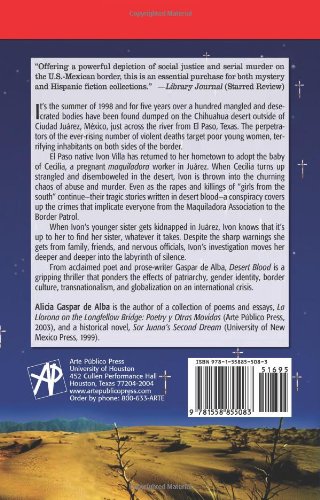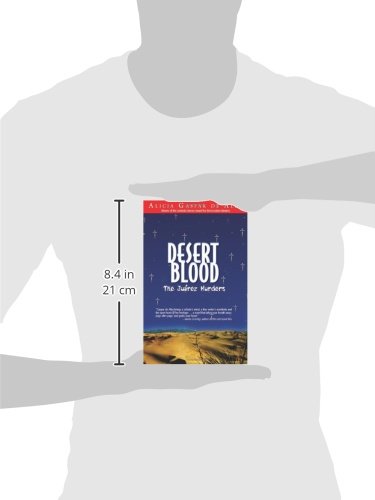Customer Services
Copyright © 2025 Desertcart Holdings Limited




Desert Blood: The Juarez Murders
M**I
Gripping hard-boiled story with gruesome basis in reality (Spoilers)
NOTE: Spoilers Abound Alicia Gaspar De Alba’s "Desert Blood: The Juarez Murders" is rich with the elements of borderland literature and uses the hard-boiled mystery genre to explore these elements such as hybrid identities, the clash between cultures, and the marginalization of both ethnic groups and women. Melissa W. Wright’s “The Dialectics of Still Life: Murder, Women, and Maquiladoras” provides context for De Alba’s exploration of death by culture and waste in the Juarez murders, as depicted in Desert Blood. De Alba uses Desert Blood to craft a tale about the Juarez murders and in doing so, she explores many recurring themes in borderland literature. However, I will focus on the theme of marginalization of persons in terms of ethnicity and gender (in this case, women living on both sides of the U.S./Mexican border but primarily those on the Mexican side). This marginalization ties in with Wright’s discussion of death by culture and waste. Desert Blood abounds with examples of how women are seen as expendable commodities, ranging from women as laborers to women as breeders, to women as sex objects, and women as the ultimate expendable commodity—women to be used in snuff films and executed. Even worse, the reasons that create and sustain this quandary are ignored, with the women themselves blamed for their exploitation through “death by culture.” As Ivon Villa uncovers the many layers of conspiracy surrounding the Juarez murders, she finds a society largely indifferent to the deaths of hundreds of women. Women (particularly young Mexican women) are seen as expendable commodities not only for labor, but for their bodies. Their deaths are often brushed off as the results of the victims’ own perceived bad choices, creating a culture of blaming the victim. Ironically, Ivon is oblivious to that she is exploiting women as commodities too. The concept of waste is related to how victims are blamed for their deaths. The concept of waste in workers relates to the marginalization of workers, primarily female workers. Wright notes how the Maquiladora owners and management see female workers as incapable of the same work as male workers. They also see women as carrying potential liabilities such as getting pregnant, regulating their fertility through means such as pregnancy testing and birth control, regardless of this being illegal. Not only are these women treated unequally, but the industry exploits them paying them far less than their American counterparts (this applies to men as well) Women who seek better wages or treatment are repeatedly told there are many women waiting to take their jobs. The concept of women as commodities is also seen with Ivon and Bridget’s desire to adopt a baby. This leads Ivon back to El Paso, Texas where she will pay Cecilia for her baby. Cecilia, a terminally ill former maquiladora who cannot afford to care for herself, much less a baby, is a human commodity because her pregnancy will pay for the value she has lost as a maquiladora (due to prohibitions on employees becoming pregnant). When Cecilia and her baby are murdered, Ivon goes to “Plan B,” seeking to adopt a young boy. Ivon’s marginalization as a lesbian (which would make it more difficult to adopt, particularly in the late 1990’s) should make her more sensitive to Cecilia’s plight, but it’s arguable Ivon sees Cecilia as a commodity, rather than a person. The ultimate representation of women as commodities is their use in snuff films. While searching for her sister, Ivon uncovers a far-reaching conspiracy where young women are abducted for use in snuff films. The violence towards women and their brutal murders is an example of how women are treated as the ultimate commodities—here to be used as human sacrifices to monetize a streaming site. The women are abducted and killed on camera, epitomizing human capital. The concept of death by culture abounds in Desert Blood. Death by culture, Wright notes how authorities often blame female murder victims for their own deaths, claiming they are places they shouldn’t be and/or they are engaged in immoral behaviors that contribute to their deaths such as going to bars and seeking freedom from restrictive homes. De Alba shows this in Desert Blood when female victims are seen as being in areas they shouldn’t be. For example, when Irene goes missing, her presence in the colonia is questioned. This idea of cultural boundaries is seen when Irene and Ivon’s mother Lydia question what Irene was doing at a borderland fair. Even the people at the fair question Irene’s presence, seeing her as an outsider. When Ivon travels to Mexico to investigate her sister’s disappearance, she is repeatedly questioned what she is doing there, implying her presence is an invitation for trouble. Blaming the victim is a convenient way of ignoring more plausible reasons for the victims’ deaths. For example, the fact that women’s desperate economic plight force them to seek employment (and travel to and from work in dangerous areas) is generally ignored. There are many borderland literature issues addressed in Desert Blood, but De Alba’s exploration on the theme of the marginalization of women dominates the work. This marginalization reduces women to objects whether it be workers, breeders, or human sacrifices, human capital to be used until they are treated as disposal waste. This is disturbing in a fictional realm and horrifying when one realizes its strong basis in reality.
S**0
A story that needs to be told
The sad fact is that the stories that should receive the most coverage in the news often go practically ignored. Since 1993 an atrocity has been going on at the US-Mexican border that has left hundreds of women raped, mutilated and dead while very little has been done to solve the crimes and stop whoever is behind them. This is the setting that Gaspar De Alba has chosen for her Lambda Award winning novel as she tells the story of Ivon Villa, who is drawn into the situation when her sistr disappears in Mexico.Desert Blood builds at a pace that leaves the reader feeling the growing terror Ivon experiences as she faces the idea that she may find her sister too late. There is so much to this plot that it almost becomes one of the book's weaknesses. There are three stories that run at once - the disappearances of Irene and the other women, Ivon's quest to adopt a child and her relationship with her family over her lesbianism. The stories of the women would have been enough to make a complete book and the other two strains sometimes distract from that. That could actually be a plus though because the one story is so horrific that the reader needs some release time away from it. One irritating aspect of the book is that De Alba includes a lot of comments in Spanish. Given the setting of the book, it's appropriate, but there are no translations for those readers who do not speak the language and the impression is left that parts of the story are being missed or not understood. A glossary of some time would have been helpful.The compelling nature of this story makes it a book that should be read. Anyone looking for a romance with steamy sex scenes won't find that here, but they will find an issue that will move them to anger and an extremely well written novel.
L**A
An intensely important narrative!
I purchased this book almost a year ago based on the title, my interest in the subject and because I had read some of Gaspar de Alba's poetry in the past- the fact that we share the same first name may have also had a role in my purchase.Between taking seven courses my last semester in college and moving across country my life has finally slowed down to the point where I can read this book. I took it on a flight to Houston Texas this weekend and haven't put it down. If not for the wedding festivities that I had to participate in- I would have finished this book in the first 24 hours. I am an avid reader and a proud queer Xicana and this is the first fiction novel that I have picked up that felt so comfortable. From the Pepe Aguilar concert at the carnival to Irene's experience as a pocha in a border town- it was as if someone I knew or was related to was the main character in this story. Queer Chicanas with Ph.D's are few a far between but a novel that writes about the life and experiences of Ivon as she exists as a regular human being with intersectionalities and emotions and desires is priceless. Not only does this story bring out the reality of Juarez and the femicides but it also brings out a invisible narrative of a butch and one that does not turn her into a charicature- she's just normal.From one Alicia to another- Thank you, I needed this story to exist.
M**R
Don’t think twice, buy it, read it, share it.
Such a great read. It gripped me, hands glued to both ends and I could not put it down. It bothered me to the core when someone interrupted me while reading. This book is amazing, well written, excellently executed. It gave me all the emotions; anger, sadness, joy, laughter, rage. I recommend this book to everyone. She captures the Femicides in Juarez with enough detail to cause heartache. Write another book, girl!
T**E
INTENSE!
This novel was one of the texts analyzed for a paper about racialized and gendered violence in the borderlands. (In conversation with Stella Pop Duarte's If I Die in Juarez.) Gaspar de Alba interrogates the US-Mexico political and economic structures that allow the violence against women to continue in Juarez. I felt a little too close to the protagonist Ivon who was working on her dissertation and fighting to protect her younger sister. Gracias Profe!
C**A
Fesselnd!
Ein super Buch, welches mit der schwierigen Thematik gekonnt umgeht. Das Englisch war sehr gut zu verstehen, das Spanisch in meinem Falle leider nicht. Teilweise fluchen bzw. unterhalten sich die Protagonisten auf Spanisch und leider ist keine Übersetzung in den Fußnoten!In der Mitte zog sich das Buch für meinen Geschmack etwas hin bzw. das Ende war eher kurz und abrupt. Ich möchte hier eher weniger auf den Inhalt eingehen, da es dafür bereits sehr viele informative Zusammenfassungen im Internet gibt!Super geschrieben und man beschäftigt sich definitiv etwas intensiver mit dem Thema. Auch nach dem Buch!
Trustpilot
1 month ago
2 months ago